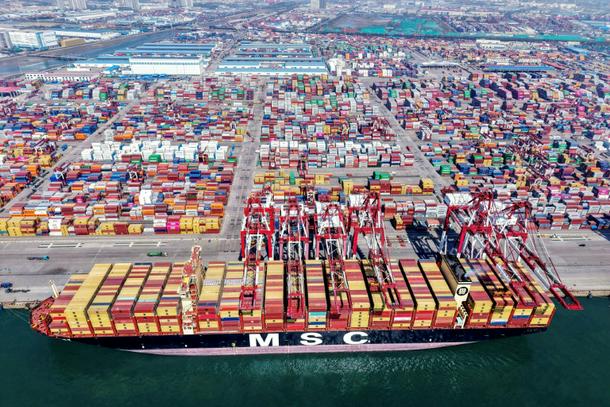
Global trade could fall by as much as 1.5 percent this year, the WTO warned
Geneva (AFP) - Global trade is expected to plummet this year in the wake of President Donald Trump’s tariff offensive, fuelling uncertainty that threatens “severe negative consequences” for the world, the World Trade Organization warned Wednesday.
Since returning to office, Trump has imposed a 10 percent tariff on imports of goods from around the world along with 25 percent levies on steel, aluminium and cars.
While Trump made a U-turn on steeper tariffs for dozens of countries, he has escalated a trade war with China, slapping 145 percent levies on Chinese goods while Beijing retaliated with a 125 percent duty on US products.
“I’m very concerned,” WTO chief Ngozi Okonjo-Iweala told reporters, adding that the organisation expected to see trade volumes between the United States and China crumble by a whopping 81 percent.
“The enduring uncertainty threatens to act as a brake on global growth, with severe negative consequences for the world, the most vulnerable economies in particular,” she warned in a statement.
At the start of the year, WTO expected to see global trade expand in 2025 and 2026, with merchandise trade seen growing in line with global GDP, and trade in services growing even faster.
But in the organisation’s annual global trade outlook published Wednesday, it determined that as things stand, world merchandise trade is on course to fall 0.2 percent this year, “before posting a modest recovery of 2.5 percent in 2026”.
The 2025 number, calculated in line with the tariff situation on April 14, is already nearly three percentage points lower than what would have been expected without the tariffs Trump has slapped on countries around the globe.
- ‘Severe downside risk’ -
The WTO warned that “severe downside risks” could see trade “shrink even further, to 1.5 percent in 2025, if the situation deteriorates”.
The WTO also cautioned that services trade, while not directly subject to tariffs, was also “expected to be adversely affected”.
The global volume of commercial services trade was now forecast to grow by 4.0 percent – around a percentage point less than expected.
This year, the impact of the tariffs was expected to be felt quite differently in different regions, the WTO said.
“Under the current policy landscape, North America is expected to see a 12.6-percent decline in exports and 9.6-percent drop in imports in 2025,” the organisation said.
“The region’s performance would subtract 1.7 percentage points from world merchandise trade growth in 2025, turning the overall figure negative,” it pointed out.
Asia was projected to post “modest growth”, with both exports and imports set to swell by 1.6 percent.
Chinese merchandise exports in particular were forecast to rise by between four and nine percent across all regions except North America, “as trade is redirected”, WTO said.
And European exports were on track to grow by one percent, and imports by 1.9 percent.
- ‘Decoupling’ -
The WTO said its economists expect global gross domestic product (GDP) to grow 2.2 percent this year, and 2.4 percent in 2026.
The organisation said it expected tit-for-tat tariffs to have only a “limited” direct impact on that figure.
But Okonjo-Iweala told reporters the “sharp projected decline in US-China bilateral trade” risked more “far-reaching consequences”.
While US-China trade accounts for just around three percent of world merchandise trade, she warned that what appears to be the ongoing “decoupling of the two economies” could lead to “a broader fragmentation of the global economy along geopolitical lines into two isolated blocks”.
In that scenario, “our estimates suggest that global … GDP would be lowered by nearly seven percent in the long term”, by 2040, she said.
“This is quite significant and substantial.”
Faced with this crisis, Okonjo-Iweala called for reform, urging countries to “inject dynamism” into the WTO.
In particular, she called for the organisation, which only acts through consensus – a painstakingly slow process –, to “streamline decision-making, and adapt our agreements to better meet today’s global realities”.
“We shouldn’t waste this crisis.”